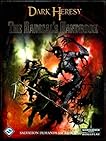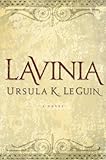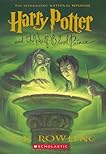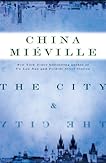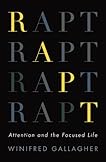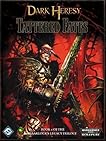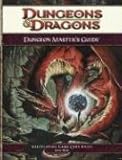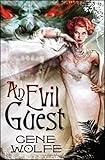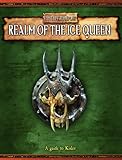 Rogue Trader RPG: Core Rulebook
Rogue Trader RPG: Core Rulebook by
Fantasy Flight GamesMy rating:
4 of 5 starsThis is the new Warhammer 40,000 role playing game from
Fantasy Flight Games (FFG). I'm looking at the collector's edition, but aside from the binding, the paper, and the case it comes in, it's the same content as the normal edition.
I can think of two types of people who may be interested in this book, and I'll try to address each of them. Number one, people who are interested in playing the game, either as a player or a Games Master (GM). Second, since this is an offshoot of Dark Heresy, another game set in the same grim future, would Rogue Trader be useful as a source book for that game?
What's special about this game? The players start out with their own starship, and in charge of a crew that numbers in the tens of thousands. They have so much money, they don't bother to count it. They are outside the Empire of Man, and a law unto themselves (mostly). There is starship combat, exploration, black market dealing, and buying and selling of entire worlds. Big scope.
All the rules for playing the game are here in this one book. This core book is for both the GM and the players. You can count on plenty of supplements being published in the future, but they are not required. You can buy this book, some dice, and play for years.
The rule set is based on the same rules used in Dark Heresy. And the Dark Heresy rules were based on the rules from the second edition of Warhammer Fantasy Role Play. Which is interesting, because FFG just abandoned those rules for Warhammer Fantasy Role play and are coming out with a total redesign for a third edition.
In any case, players familiar with Dark Heresy will feel right at home in Rogue Trader. In fact you can bring your Dark Heresy characters right in and they will work in Rogue Trader adventures. Combat works the same way, the skills and talents overlap considerably, and equipment is interchangeable. Psychic power has gotten a makeover, and is more similar to the rules for everything else, abandoning the dice pool for the same percentile dice roll used for navigating a starship, shooting a bolt gun, or charming an ambassador. There are conversions from Rogue Trader psychic powers to those in Dark Heresy and back again.
Rogue Trader is a fine sourcebook for Dark Heresy GMs. They could use almost everything in this book. Not the profit and commerce rules, but pretty much everything else. Dark Heresy characters at the end of rank five are about as powerful as starting Rogue Trader characters. A heretic Rogue Trader would be an interesting and powerful high level challenge for a group of Dark Heresy acolytes near their top ranks.
For people unfamiliar to Dark Heresy, the basic rules are simple: roll percentile dice to do anything, trying to roll you skill or under. If you roll well under or well over, special things happen, either for or against you. Complexity comes from what skills you have, how they are modified, and what toys (more on that later) you get to use. Like most role playing games, the complexity is layered on, and the game starts out with a limited number of choices and then grows more interesting as new avenues open up. Note that anything Warhammer 40,000 is not realistic science fiction simulation. Over the top cool beats realism 100% of the time in this Gothic future.
What if you know nothing about the Warhammer 40,000 world? Unlike the new fourth edition of Dungeons and Dragons rulebooks, this book is fun to read. It is drenched in deep background. I think you could pick up the main thrusts of this grim and Gothic future with just this book. If you want more, there are plenty of books, games (computer and tabletop), and websites full of 40K backstory. Certainly for a player, this is all you need. GM's will probably be drawn to finding out more. I'm sure FFG will be cranking out supplements for some time full of information.
I am impressed with the starship combat rules. Every player character has important work to do, every round. The rules cover ramming and boarding action. The rules are abstract, cinematic, and evocative. But if you get a direct hit on your opponent's warp drives? Try not to be too close and get sucked into the warp, perhaps forever.
But is it pretty? The art is fine, about on the level of a good graphic novel. Sometimes a very good graphic novel. Which is about par with most of art in Dark Heresy. However, it doesn't have the truly great art found mostly at Chapter Heads of Dark Heresy.
Problems:
There is no way to land on a planet. The players can design their own starship, but the book doesn't mention shuttles.
The rules cover how skilled the starship crew is, but not how that skill could be improved.
They mention retainers, which sound like high level crew members, but there are no rules to cover them.
There are suggestions on what to do if no one wants to play the Rogue Trader, but not the other top crew positions. What if there is no player navigator? And the crew is fairly unskilled? The ship might never go to its intended destination. That's when I think a high level NPC would be hired, but the GM will have to wing this.
Role Playing Game Checklist- Character Creation: Yes, including a varied background that allows characters to share past history with each other.
- Character Origins cover Home World, Birthright (childhood), Lure of the Void (why they are driven to leave the Empire), Trials and Travails (past history), Motivation, and Career.
- The career paths are: Rogue Trader, the captain; Arch-militant, the combat monster; Astropath Transcendent, the blind telepath; Explorator, the bionic engineer; Missionary, the fanatic priest; Navigator, the three eyed mutant who can guide the ship through the warp; Seneschal, the expert who can uncover the secrets; and Void-master, the pilot. There is plenty of room to customize each career, and all of them are useful in personal and ship to ship combat.
- Cool Toys: Oh, just starships and chainswords (chainsaw-swords) and power armor. And alien artifacts, and, and, and...
- Cool Powers: Every career has it's own shtick, a way to do something cool no one else can. Both the Astropath and the Navigator have psychic abilities.
- GM Bits: A chapter on how to GM, three chapters on background, a chapter on bad guys and aliens, and a starting adventure (players should not read!)
- Player Controlled Storytelling: Not much, not required, but some. Players are encouraged to come up with descriptions of their home world. Players can take the initiative and help create endeavors to increase their wealth, power and prestige. On a scale of 1 (4E) to 10 (Burning Wheel), I'd give Rogue Trader a 3 or a 4, depending on how it's played.
- World Background: Well, Galaxy background. Three chapters devoted to it, and the rest of the book is drenched in world building. The game assumes the players will be exploring the Koronus Expanse, a sector of the galaxy that gets it's own chapter.
- Monsters and Bad Guys: 36 pages of Adversaries and Aliens. You can also bring in any from Dark Heresy.
- Sample Adventure: Yes, which introduces the players to the Koronus Expanse and touches on a some of the high points of the game. It looks like a fun one.
Overall: Great game. I'm still having fun with my Dark Heresy game, and will use this as a sourcebook until I, and my players, are ready to move over. I'm looking forward to it.
View all my reviews >>
 There are plenty of reviews of the computer role playing game Dragon Age: Origins, but I wanted to take a look at the software as a piece of interactive fiction.
There are plenty of reviews of the computer role playing game Dragon Age: Origins, but I wanted to take a look at the software as a piece of interactive fiction.


